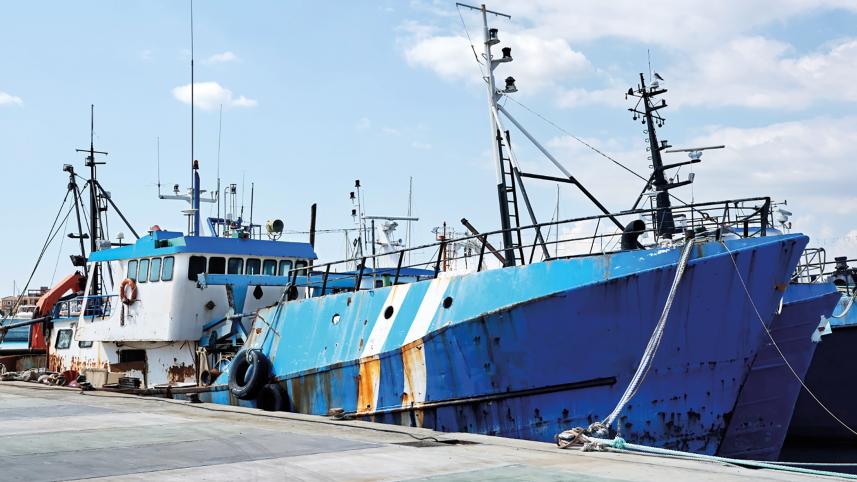Deterrence and international legal compliance as key to Bangladesh’s maritime security

The Bay of Bengal, central to the nation's "Blue Economy" ambitions, is a zone of immense opportunity. However, it is also an arena where transnational criminal syndicates consistently challenge maritime security and national sovereignty. For instance, in April 2025 alone, the river police seized over 2.7 crore metres of illegal fishing nets during a six-day operation, arresting 248 suspects.
Certainly, patrols alone cannot secure long-term prosperity or security in this riverine country. Rather, a formidable legal architecture is required that aligns with international law and establishes a rigid punitive framework creating a powerful deterrent against illicit activities. Bangladesh's key maritime agencies have, on multiple occasions, acknowledged how the criminals exploit the legal loopholes proficiently. To truly command its maritime territory, Bangladesh must emphasise two core pillars: unwavering compliance with international legal obligations and systematic strengthening of domestic laws.
Bangladesh is duty-bound under key international legal instruments that regulate the maritime zones. For example, the United Nations Convention on the Law of the Sea (UNCLOS), serving as the 'constitution for the oceans,' outlines the fundamental obligations of the states. For narcotics, the 1988 UN Convention against Illicit Traffic in Narcotic Drugs and Psychotropic Substances explicitly obligates the ratifying states to fully cooperate in suppressing illicit trafficking by sea. It is further cemented by the broader UN Convention against Transnational Organized Crime (UNTOC), which makes it mandatory to criminalise and combat every activity of the organised criminal groups that orchestrate such trafficking operations. Similarly, agreements such as the UN Fish Stocks Agreement establish principles for the conservation and management of fisheries, while the FAO's Agreement on Port State Measures (PSMA), obligates the implementation of strict port controls to prevent vessels suspected of IUU fishing from landing and selling their illicit catch.
However, a comprehensive review of all domestic laws related to maritime crimes, from the Territorial Waters and Maritime Zones Act (TWMZA), 1974, as amended in 2021, to the Narcotics Control Act, 2018, and Marine Fisheries Act, 2020 (MFA), reveals minute inconsistencies that blunt full implementation of international duties. For instance, a lack of internal legal clarity, such as confusion over which statute to use for prosecuting a narcotics case or a case of IUU fishing, directly hinders the state's authority at sea and weakens the prosecution's case.
Achieving full acquiescence requires a seamless and unambiguous legal chain from international obligation to domestic court conviction. Bangladesh must ensure that the laws and procedures are fully harmonised at the implementation level to ensure deterrence at the root level.
Deterrence is fundamentally about risk versus reward. For too long, the rewards of illegal fishing and narcotics trafficking in the Bay of Bengal have outweighed the risks. To reverse this equation, the legal framework must be strengthened on the fisheries front by implementing impactful changes to the MFA. Concurrently, for narcotics trafficking, dismantling the financial incentives by simplifying the bureaucratic hurdles to monitor and track illicit money is paramount. It also means enacting proactive laws, such as requiring courier services to install narcotics detection equipment, and safeguarding the integrity of prosecutions by establishing secure, district-wise storage facilities for seized drugs to prevent tampering with evidence.
Effective deterrence also requires an efficient judiciary. Following the recent establishment of over five hundred subordinate courts in September 2025, priority should also be given to the establishment of special courts or tribunals in key maritime regions, such as Khulna and Chattogram, to prevent cases from languishing in an overburdened court system. These specialised courts, staffed by a judiciary well-versed in the nuances of maritime law, would ensure speedy trials and consistent sentencing, sending a clear message to the offenders. This must be supported by specialised training for judges and prosecutors, ensuring they are equipped to handle complex cases involving digital evidence, transnational elements, and sophisticated criminal methods.
Nevertheless, rigid laws are rendered meaningless without the operational capacity to enforce them. This calls for equipping agencies like the Coast Guard and River Police with modern technology, such as Vessel Monitoring Systems (VMS), drones, and high-speed boats. Similarly, body cameras for officers and CCTV cameras in landing ports are essential tools for ensuring the integrity of evidence and documenting crimes in action.
And lastly, developing a coordinated and inescapable enforcement front is crucial as criminals thrive in the grey areas between jurisdictions. This requires establishing a robust inter-agency joint monitoring system and clarifying the distinct operational responsibilities of the Navy, the Coast Guard, the River Police, and other relevant ministries. This must also be extended regionally through joint patrols and real-time intelligence sharing with neighbouring countries, ensuring there are no safe havens for criminals in the Bay of Bengal.
The writer is Advocate of the Appellate Division, Supreme Court of Bangladesh and Dean, Faculty of Law, Eastern University, Dhaka.
 For all latest news, follow The Daily Star's Google News channel.
For all latest news, follow The Daily Star's Google News channel.
Comments